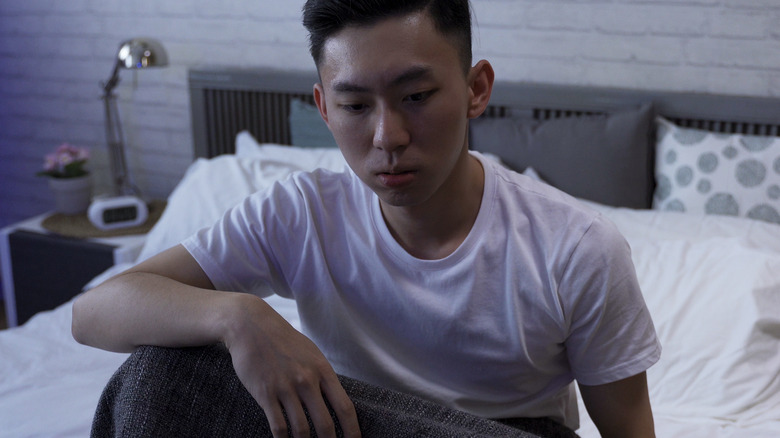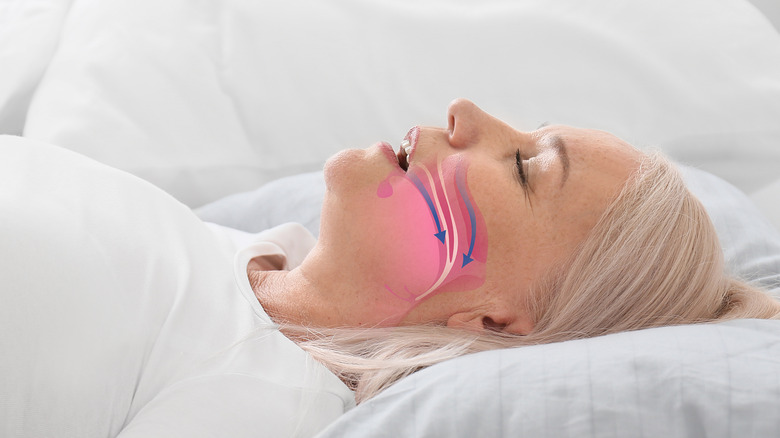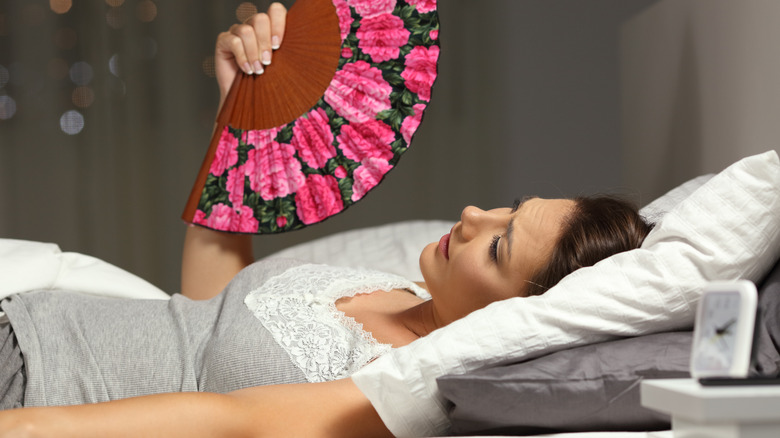Sleep Apnea Could Be The Cause Of Your Night Sweats
Sleep apnea is a serious disorder that causes your breathing to start and stop abruptly while asleep (via Mayo Clinic). As a result, you might wake up fatigued and sleepy, even after slumbering for eight hours. Obstructive, complex, and central are the three types of sleep apnea. However, the most commonly occurring is obstructive sleep apnea, reports Medical News Today. This type of sleep apnea is highly prevalent in males, typically those who are bulkier and prefer to sleep on their backs.
Affecting around 18 million Americans, sleep apnea is a common sleep disorder in the country, reports Houston Sleep Solutions. It is not specific to any age, but statistics reveal that it affects more Caucasians than African Americans. Unfortunately, despite the increasing awareness about this condition, about 1 in 50 people in the U.S. have an undiagnosed case of sleep apnea. According to Cleveland Clinic, the symptoms of sleep apnea include feeling sleepy during the day, heavy snoring, frequent urge to pee during the night, and general restlessness. It's also common for people with sleep apnea to have dry mouths, forgetfulness, moodiness, or frequent headaches. Many people with sleep apnea also struggle with night sweats.
How sleep apnea may cause night sweats
Many people sweat when asleep, typically during hot weather or when the bedroom temperature is too hot. However, per Mayo Clinic, night sweats are a condition that results in so much heavy sweating that it might cause your bedding or clothing to become wet at night. Experts believe night sweats often indicate an underlying illness. Healthline reveals that night sweats may be caused by tuberculosis, low blood sugar, cancer, or hyperthyroidism. People with anxiety or women who have entered the menopause phase may also experience heavy night sweats. Healthline further reveals that night sweats may also occur frequently if you are a heavy drinker or addicted to caffeine.
Sleep apnea is also associated with an increased risk of night sweats. SleepScore Labs reports that a study discovered night sweats episodes more than three nights a week in about 33% of the population with obstructive sleep apnea and only 12% in those without sleep apnea. According to WebMD, one reason might be that when your body isn't getting sufficient oxygen during sleep apnea, it may trigger the body's fight-or-flight response. This may result in increased sweating and sudden awakening at night.
How you can ease night sweats at home
According to CPAP Supplies, experts have discovered that treating sleep apnea symptoms could also help ease night sweats. Research states that the rate of night sweats in people with sleep apnea dropped from a whopping 33% to 11% after administering PAP (positive airway pressure) treatment in sleep apnea patients. According to SleepScore Labs, it's important to seek guidance from a doctor right away if, in addition to night sweats, you experience other symptoms of obstructive sleep apnea such as fatigue, sleep deprivation, lack of focus, sexual dysfunction, irritability, or increased need to pee during the night.
In case the symptoms worsen, besides taking the right medical treatment, making some changes in your lifestyle could also offer relief from sleep apnea. For instance, Medical News Today recommends switching to side sleeping as it takes the pressure off from the chest and throat, allowing more room to breathe. Plus, you may want to refrain from smoking or drinking before bedtime. If you want to naturally ease symptoms of night sweats, you can also try to increase ventilation in your room by opening a window or adding a fan, suggests Healthline. It's also good to get rid of extra layers or blankets. You may also want to choose light fabric attire when you go to bed.



